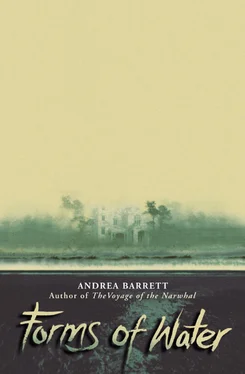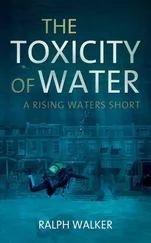In the margin, surprising her, were words in Da’s spidery hand. I have not seen this, he’d written. But perhaps it snows more heavily over the reservoir than elsewhere? All the breath in all those drowned houses …
He meant the Stillwater, Wiloma knew — the very place she’d seen tonight for the first time since childhood. An easy seven-hour drive, which she’d never made; the place Da had ranted and raved about and that her father had brooded over. Da had told his stories again and again while she and Henry sat trapped at the dining room table in Coreopsis, and the stories had been different from, but related to, the ones their father had told them on Sunday mornings. Six villages lay in that valley, Da had said; and he had been born there and Gran had come as a little girl, from Ireland; and he and Gran had married and had two boys and one had gone to China; and he couldn’t leave his farm to Wiloma’s father because it lay under the water; and the land was taken and leveled and burned. Of course she’d never made the drive, she’d always known what she’d find here. Graves, ashes, ruins, bones. Being back here was like losing her parents all over again.
In the weeks before Da’s death, he had hardly ever recognized her. She’d been grateful for that — she did not want him, did not want anyone, to know the ways in which she touched him. For weeks she had rolled his body from side to side each day and changed the sheets beneath him. She’d washed and powdered and bandaged the sores on his shoulders and elbows and back; she’d passed a damp cloth over his nipples and crotch and the deep hollows above his collarbones. She’d taken his pulse, she’d taken his temperature, she’d cleaned his mouth and ears. But Da had slept through all that, or drifted in some state that was like sleep, only wilder, and she’d told herself he didn’t know whose hands touched him.
On the night before his death, she read and dozed and tended to him and read. The sun rose and the cicadas began their August drone. From time to time she touched his head or raised him slightly or lowered him, trying to ease his labored breaths. In his dreamy state that wasn’t sleep he could follow her instructions: Lean forward, Da. Can you swallow this? The doctor had left pills for her to place under Da’s tongue, but sometimes the wedge-shaped hollow there was so dry that the pills wouldn’t dissolve. She lifted his tongue like a piece of cloth and dripped water onto the tablets, rain from her fingertips.
Swallow, Da, she remembered saying. Can you swallow? He lay somewhere between sleep and death, already far away, and when she could pull her eyes away from him, she read. She skipped around in his book and read the bits he’d underlined, trying to find what had comforted him.
What is the structure of the ice over which we skate in winter? she read. Quite as wonderful as the flowers of the snow. I have seen in water slowly freezing six-rayed ice stars formed, floating freely on the surface. Lake ice is built of such forms wonderfully interlaced.
Da and Gran had brought her and Henry to Coreopsis in the winter, when the reservoir was frozen; she and Henry had come because they had no place else to go and stayed because they were children. A stream ran through their new place and fed the onions and corn and squash; rain fell and became confused with the rain that had fallen the night of the dance and the steam that rose from the cows in winter and the snow that fell and would not stop. The old pond, Da had written in his book, near the drawing of an ice flower. I pulled Brendan out the day he went through the ice.
He and Gran had saved her and Henry just as surely, Wiloma thought, but they hadn’t been able to see it then. Exhausted, broken-tongued, they’d clung together at school, where their new classmates had treated them as if their misfortunes were contagious. But the farm had been so silent it had frozen them silent, too, and Da, so old even then, hadn’t been able to find the words to make them talk.
Da breathed through his open mouth, the three teeth that had anchored his bottom plate standing dry and yellow, like stumps. “Tonight, maybe,” the doctor had whispered, when he’d visited at noon. He’d moved his stethoscope over Da’s back and said, “His lungs are filling. It won’t be long.” When he left, she’d moistened a cotton swab and rubbed it over Da’s lips and gums. He’d moved his tongue; he’d swallowed.
You cannot study a snowflake profoundly without being led back by it step by step to the contribution of the sun, she read. It is thus throughout nature. All its parts are interdependent and the study of any one part completely would really involve the study of all. The words were engraved on her brain still — all the words she’d read those last two days. She had never been able to forget either them or the way Da had looked.
At ten, that last night, he opened his eyes after rolling in pain for hours. He said, “Eileen! Watch out, you’ll tear your dress”—he’d been talking to Gran, Wiloma remembered, as if Gran were there in the room with them — but then he said, quite lucidly, “Wiloma. Am I going someplace after this? Will I know you’re all right? Will I see you?”
This, when after Gran’s sudden death he’d begged to follow her. All his bark had vanished, all the flinty reserve that had made her hide her heart from him, and she looked into his cloudy eyes and lied. Or said what felt to her like a lie: “Yes,” she said.
“How do you know?”
“I just know,” she said, thinking of the times, all through high school, when she’d dreamed of leaving Coreopsis. A hundred times she’d imagined taking her diploma, leaving the stage, setting aside her cap and gown, and picking up her suitcase. Taking a bus to anywhere, leaving that life for another. She tried to offer Da a similar version of comfort — not the one she would offer now that she had the Church, but the best she could manage then. “You have to have faith,” she said.
He shuddered and she knew what was troubling him: he’d been raised a Catholic but had scorned his church since the reservoir had drowned it.
“Not what the priests told you,” she said. “Just faith. That there’s something else, another place.”
“What does it look like?”
And she tried — she’d been so young then, so ignorant, it had been the best she could do — to invent something pleasing. “There’s a valley,” she said, and as she spoke she saw it clearly in her mind. Gran had told her and Henry a story when they’d first come to Coreopsis. A boat, a journey, a secret place. Talking animals. The land of the blessed, Gran had said. The country of the young. Henry had sat on the chair beside them, rocking, waiting, and she had curled around Gran’s legs, listening to her tales.
“There’s a tree,” she told her grandfather. “In the valley.” His lids were transparent and the veins in them branched like coral. She told him about the fields and flowers and streams, the animals grazing, the flocks of birds. How the sun shone all day, how it was never too hot or too cold; how at night it rained just enough for the plants and how fruit hung from the branches.
“Are there people?” he asked.
“Lots,” she said. “No one ever grows old there. No one ever dies.” He grasped her thumb with his finger and held on. “Gran is there,” she continued. “And my parents, and yours. It will feel like you’ve come home.”
The words seemed to comfort him, and he fell back to sleep before she could say anything else. The stars moved; his fever rose. When she went to take his pulse, his arm felt cool and waxy, and she couldn’t find the flutter she’d counted with her fingers for so long. She brushed her hair from her ear and pressed her head to his chest — there was his heart, beating still, but muffled and much too fast.
Читать дальше












